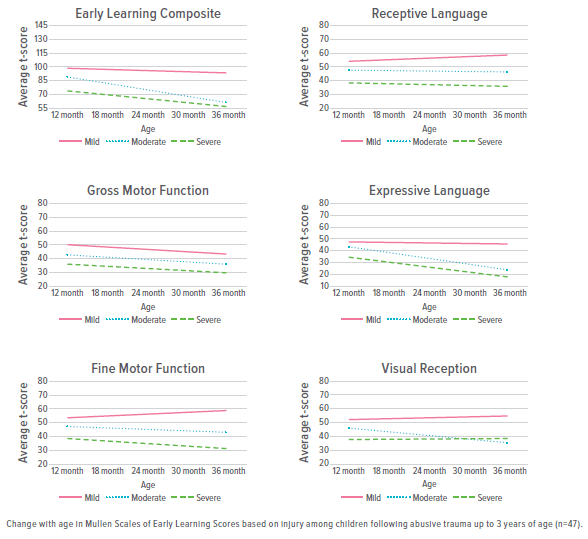Developmental Delays May Present at Later Ages Following Abusive Head Trauma in Infants
Published July 2020 | Child Abuse & Neglect
When pediatric patients experience abusive head trauma, short- and long-term outcomes will be different for every child. Understanding these outcomes and their potential predictors could help patients receive the care they need.
For many years, researchers in the Mayerson Center for Safe and Healthy Children have been following patients in a clinic dedicated to post-injury care for abusive head trauma. Now, they are using these data to assess developmental outcomes.
Participants included infants who were admitted to a large pediatric hospital with abusive head trauma over a seven-year period. Researchers divided these patients into mild, moderate, and severe injury groups based on time spent in intensive care.
Using the Mullen Scales of Early Learning, researchers assessed patients’ development at approximately six-month intervals up to three years of age—an average of 19 months post-injury. Around age 2, the team also assessed behavior and quality of life using the Child Behavior Checklist and PedsQL™.
Researchers found that overall cognitive development, fine motor function, and expressive language declined with age up to three years, even beyond initial assessments. Patients with at least moderate injury severity also displayed greater internalizing behaviors when compared to the mild group.
“These results show that long-term follow-up of all patients following abusive head trauma is important and recommended, even if the patient is initially meeting all developmental milestones,” says corresponding author Kathi Makoroff, MD.
Researchers will continue to follow this patient population to assess longer-term outcomes.
Early Learning Scores After Abusive Head Trauma
This figure demonstrates the different domains tested by a standardized developmental assessment and shows the change in development over time for patients who have been diagnosed with abusive head trauma.





